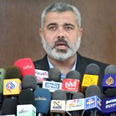
Haniyeh: Hamas gov't won't step down
Top UN official says conditions in Gaza have reached breaking point; yet instead of forcing Hamas to moderate, tough policies have made Palestinians more intransigent, she adds
Hamas' takeover of the Palestinian Authority in March has provoked crushing international sanctions that have rendered the government unable to pay its 165,000 employees for the past six months.
In the widest sign of growing displeasure with Hamas, tens of thousands of teachers, health workers and other government employees launched an open-ended strike last Saturday. The work stoppage - organized in large part by the rival Fatah movement - has threatened to bring down the government.
"The government is not going to resign," Haniyeh told 2,000 worshippers at a mosque in the southern Gaza town of Rafah. "We have no thoughts of resignation or dismantling the (Palestinian) Authority."
Western donor nations, which provide hundreds of millions of dollars of aid to the Palestinians each year, cut off the funding to pressure Hamas to renounce violence and recognize Israel. Adding to the pressure, Israel has frozen the transfer of hundreds of millions of dollars in taxes it collects for the Palestinians.
Without these funds, Hamas has managed to pay only tiny, irregular stipends to government employees. Still, the group, which is committed to Israel's destruction, refuses to moderate. In the meantime, tens of thousands of Palestinians have been left to live off savings or credit.
While the crisis has affected all Palestinians, it has hit especially hard in the Gaza Strip – where Israel launched a military offensive in June after Hamas-linked militants tunneled into Israel and captured an Israeli soldier. The offensive has killed more than 200 Palestinians, most of them gunmen.
'Pressure tactics created mass despair'
In New York, Karen AbuZayd, the head of the UN agency for Palestinian refugees, said conditions in Gaza have reached a breaking point. Yet instead of forcing Hamas to moderate, the tough policies have made the Palestinians more intransigent, she said."Strangulation of commerce and trade has ruined the economy, brought institutions of government to a point of near meltdown and badly shaken the society," She said.
"These pressure tactics have not resulted in a desire for compromise but rather have created mass despair, anger and a sense of hopelessness and abandonment."
She called on the international community to provide Gaza with a peacekeeping force or observer mission, saying Gaza's 1.4 million people deserve protection.
"It would be great to have an international presence, civilian, military, whatever," she said.
AbuZayd pointed to the success of the European Union's observers at the Rafah crossing along Gaza's border with Egypt. The crossing was opened under the control of the Palestinians last fall, and worked smoothly until the Israelis effectively closed it after the kidnapping of the soldier.
The foreign ministers of Italy and Russia both endorsed the idea of an international presence in Gaza during current trips to the region. But Israel has long opposed such a force, citing security concerns.
Palestinian President Mahmoud Abbas has been trying to persuade Hamas to join his Fatah party in a coalition government. Abbas believes a coalition will force Hamas to moderate, clearing the way for the international community to resume aid to the Palestinians and for him to restart peace efforts.
Fatah is widely believed to be behind the strike, which enters its second week on Saturday. Hamas has accused Fatah of using the strike as a pressure tactic in negotiations to form a coalition.
In the West Bank town of Ramallah, about 600 people Hamas people marched in support of the group and denouncing the strike. It was the largest public show of support for Hamas in the city - home to Abbas' headquarters - since the strike began.
The protesters, including men, women and children, praised Haniyeh and urged him to stand strong. A little girl in school uniform held a placard reading: "No to the siege that is depriving me of my right to education." Others held banners reading: "Together we stand behind the government in the face of the siege and political extortion," in reference to the strikes.










